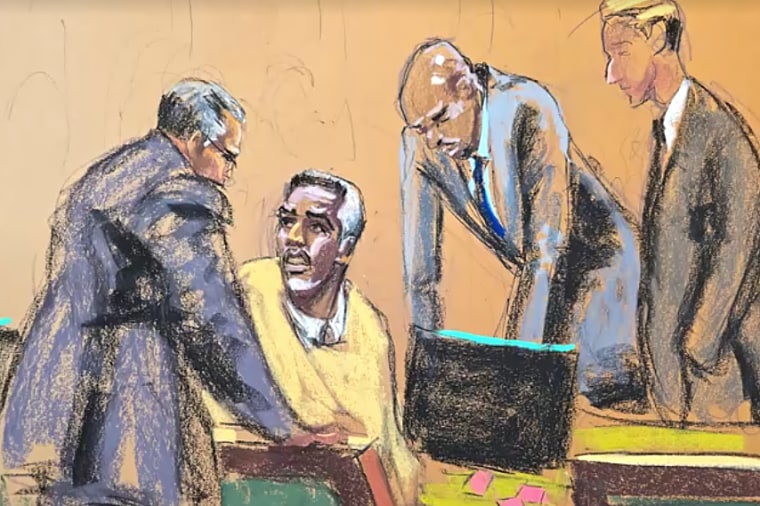U.S. government prosecutors repeatedly told jurors that Sean “Diddy” Combs was the ruthless ringleader of a criminal conspiracy, the key figure in a sprawling racketeering and sex trafficking scheme. Combs must be convicted on all five criminal counts, the prosecutors argued, and only then can justice be served.
In the end, the jury was not convinced.
The panel of 12 New Yorkers returned a mixed verdict at the climax of Combs’ federal trial Wednesday, convicting the music mogul on two interstate prostitution counts but acquitting him on the vastly more serious charges of racketeering conspiracy and sex trafficking, which each carried a maximum prison sentence of life behind bars.
In interviews, legal analysts and former federal prosecutors said the verdict was a blow to the Southern District of New York, which spent seven weeks unwinding an expansive narrative, introducing reams of graphic evidence and calling more than 30 witnesses to the stand. In contrast, the defense team did not call a single witness.
“This trial was a major gamble, and Combs won that bet,” said Anna Cominsky, an associate professor of law and the director of the Criminal Defense Clinic at New York Law School. “Everything is stacked against the defendant going into a federal case, in particular one like this.”
“His attorneys were smart and they owned the bad facts,” Cominsky added. “They fought on the things that mattered, and it paid off.”

Combs’ defense team never disputed their client’s history of domestic violence — including his physical assault of ex-girlfriend Casandra Ventura at a Los Angeles hotel in 2016. They also readily acknowledged that Combs arranged drug-dazed, marathon sexual encounters in luxury hotels called “freak offs.”
But the rapper’s lawyers always insisted that Ventura and another ex-girlfriend, identified in court under the pseudonym “Jane,” willingly participated in freak offs. The lawyers highlighted text messages in which both women expressed romantic affection for Combs and sometimes conveyed enthusiasm for their “hotel nights.”
In acquitting Combs of racketeering conspiracy and sex trafficking, jurors effectively rejected the prosecution’s assertion that the music mogul oversaw a criminal enterprise encompassing sex trafficking, forced labor, drug distribution and other acts to fulfill his sexual desires. They may have been persuaded by the defense team’s characterization of Combs as a “swinger” who had been unfairly persecuted for his lifestyle.
In sometimes sarcastic closing arguments last week, defense attorney Marc Agnifilo said the case against his client was “badly exaggerated.” Jeffrey Harris, a former prosecutor with the Southern District of New York, said jurors might have agreed that the prosecution’s case was overwrought from the start.
“Juries expect more from prosecutors than they do from defense attorneys,” Harris said, “and when prosecutors lose credibility by over-charging it usually does not end well.”
Berit Berger, a former federal prosecutor in both the Southern and Eastern Districts of New York, disagreed with the suggestion that prosecutors had over-charged Combs, but acknowledged that the defense team may have been successful in puncturing the government’s narrative, especially when it came to the question of consent.
“It’s easy to say that when there’s an acquittal on some counts, but I do think that they [prosecutors] presented evidence that met the legal elements for each of these statutes,” Berger said. “I think the defense really wanted to paint this as a situation where grown woman had agency, and could have left this relationship at any time, and they chose to stay, because there were benefits to that.”
“My guess is that resonated with some of the jurors,” Berger added.
In an interview, another former Justice Department prosecutor said the Combs verdict was a “big loss” for the office, adding that juries can get hung up on the technical elements in large racketeering conspiracy cases outside of the typical mafia and gang conduct. The jurors in Combs’ case were asked whether prosecutors had proved he had been involved in underlying racketeering acts such as kidnapping, arson and bribery.
“In those traditional contexts, witnesses can tell you why it all relates to the charged enterprise,” said the former federal prosecutor, who spoke on the condition of anonymity to express candid views. “Without that narrator from inside the enterprise or clear explicit ties, it is very hard.”
The former prosecutor said they were curious what a judge would do in post-trial motions, saying a judge could still sentence Combs severely if moved by the evidence, noting that the statutory maximum on each of the two counts he was convicted of is 10 years in prison.
Misty Marris, a defense attorney and legal analyst, said the prosecutors ultimately failed to provide a robust explanation of how Combs’ alleged criminal enterprise worked.
“They never established what the criminal enterprise was, its purpose, how it operated, who was really involved in it,” Marris said. “That really never gelled for me, and clearly the jury agreed.”
Jay Clayton, the U.S. attorney for the Southern District of New York, and Ricky J. Patel, the special agent in charge of the New York Field Office of Homeland Security Investigations, did not directly address the outcome in a statement released after the verdict.
“Sex crimes deeply scar victims, and the disturbing reality is that sex crimes are all too present in many aspects of our society,” Clayton and Patel said. “Victims endure gut-wrenching physical and mental abuse, leading to lasting trauma. New Yorkers and all Americans want this scourge stopped and perpetrators brought to justice.”
“Prosecuting sex crimes requires brave victims to come forward and tell their harrowing stories,” they added. “We and our law enforcement partners recognize the hardships victims endure and have prioritized a victim-centered approach to investigating and prosecuting these cases.”
When the verdict was being read inside the courtroom this morning, Combs got on his knees and prayed. The prosecutors remained seated, subdued and by all appearances despondent.

Leave a Reply